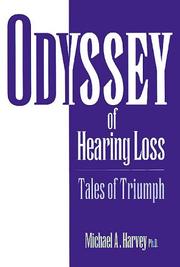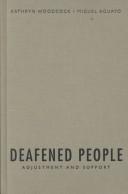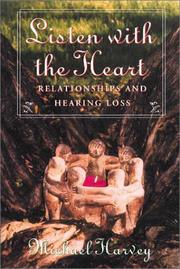| Listing 1 - 5 of 5 |
Sort by
|

ISBN: 158121006X Year: 1998 Publisher: San Diego (Calif.): DawnSign press
Abstract | Keywords | Export | Availability | Bookmark
 Loading...
Loading...Choose an application
- Reference Manager
- EndNote
- RefWorks (Direct export to RefWorks)
Deaf --- Hearing impaired --- Postlingual deafness --- Psychotherapy --- Psychology --- Case studies --- Psychology --- Case studies --- Psychological aspects --- Case studies --- Case studies

ISBN: 1442673745 1281995940 9786611995942 9781442673748 9781281995940 0802048455 9780802048455 0802083730 9780802083739 Year: 2000 Publisher: Toronto, [Ontario] ; Buffalo, [New York] ; London, [England] : University of Toronto Press,
Abstract | Keywords | Export | Availability | Bookmark
 Loading...
Loading...Choose an application
- Reference Manager
- EndNote
- RefWorks (Direct export to RefWorks)
It is estimated that there are currently 1.9 million deafened people living in North America - individuals who could once hear naturally or with amplification but have become deaf and are now unable to rely on hearing to comprehend spoken information. Despite this vast number, until now there have been few books that specifically address the process of adjustment to, and acceptance of, deafness as an adult. Kathryn Woodcock and Miguel Aguayo have addressed that situation with their unique look at deafness in Deafened People: Adjustment and Support. The authors demonstrate that deafness is not merely a medical condition; it is a social disability that affects the individual, the family, the social circle, and the work group. By describing the psychosocial experience of acquired deafness as a process of adjustment, Woodcock and Aguayo demonstrate that acceptance of deafness is a process involving practical, social, and emotional implications. To assist in that process, the authors have provided a guide to self-help techniques of proven value to deafened people. Drawing on their own experiences as deaf professionals, Woodcock and Aguayo explore such questions as how deafness occurs, how relationships (professional and personal) can be affected by progressive deafness, and how and where to find peer support. Section 1 describes the process of adjustment, while section 2 offers a practical guide to a successful method of establishing a self-help support network, with reference to such organizations as the Association of Late-Deafened Adults. Written in a lively, engaging style, the book combines medical background, professional advice, information on resources, and personal examples. Deafened People: Adjustment and Support will be invaluable for medical professionals and lay readers alike.
Deaf --- Postlingual deafness. --- Self-help techniques. --- Self-change techniques --- Self-directed change --- Life skills --- Psychology, Applied --- Acquired deafness, Postlingually --- Postlingually acquired deafness --- Deafness --- Deaf services --- Services for.
Book
ISBN: 3110125757 3110869128 9783110869125 9783110125757 Year: 1992 Volume: 62 Publisher: Berlin ; New York : Mouton de Gruyter,
Abstract | Keywords | Export | Availability | Bookmark
 Loading...
Loading...Choose an application
- Reference Manager
- EndNote
- RefWorks (Direct export to RefWorks)
No detailed description available for "Postlingually Acquired Deafness".
Defective speech --- Disorders of speech --- Doofheid na de taalverwerving --- Défauts d'élocution --- Lalopathie --- Parole [Troubles de la ] --- Pathologie de la parole --- Pathologies de la parole --- Postlingual deafness --- Speech [Disorders of ] --- Speech defects --- Speech disorders --- Speech pathology --- Spraakstoornissen --- Surdité après l'acquisition du langage --- Troubles de l'élocution --- Troubles de la parole --- Élocution [Défauts d' ] --- Élocution [Troubles de l' ] --- Complications --- Postlingual deafness. --- Speech Disorders. --- Psycholinguistics --- Physiology: movement organs, voice and skin --- Sociolinguistics --- Speech disorders. --- Deafness --- Complications. --- complications. --- Postlingual deafness - Complications. --- Deafness - complications. --- Speech, Disorders of --- Communicative disorders --- Acquired deafness, Postlingually --- Postlingually acquired deafness
Book
ISBN: 1283856786 1614510458 9781614510451 1614510431 9781614510437 Year: 2012 Volume: 47 Publisher: Berlin ; Boston : De Gruyter,
Abstract | Keywords | Export | Availability | Bookmark
 Loading...
Loading...Choose an application
- Reference Manager
- EndNote
- RefWorks (Direct export to RefWorks)
This is the first comprehensive account of prolonged hearing loss and its impact on a language that was once spoken fluently. Although it is currently assumed that hearing loss results in speech deterioration, it is shown that language loss occurs when speakers remain deaf for a long time. The reader is introduced to a significant deaf population - postlingually deafened Yoruba speakers who have been deaf for more than twenty years and who have no access to hearing aids or speech therapy. After becoming deaf, they continue to speak Yoruba from memory and "hear" visually through lip reading. These speakers exhibit phonological, lexical and syntactic losses which mirror acquisition patterns attested in the speech of Yoruba children. Based on these similarities, it is argued that a direct link exists between language loss and first language acquisition. It is further argued that prolonged deafness results in language reversal. Finally, the book presents the first description of the sign language and gestures used by deafened speakers to augment their spoken language. These findings will be of value to linguists, speech, language and hearing therapists, anthropologists, Africanists, deaf studies researchers, and non-specialists who are interested in hearing health and wellness.
Postlingual deafness --- Yoruba language --- Acquired deafness, Postlingually --- Postlingually acquired deafness --- Deafness --- Aku language --- Eyo language --- Nago language --- Yariba language --- Kwa languages --- Patients --- Rehabilitation --- Phonology. --- Deaf Communities. --- Language Acquisition. --- Language Attrition. --- Sign Languages. --- Yoruba.

ISBN: 1581210191 Year: 2001 Publisher: San Diego DawnSign Press
Abstract | Keywords | Export | Availability | Bookmark
 Loading...
Loading...Choose an application
- Reference Manager
- EndNote
- RefWorks (Direct export to RefWorks)
376.33 --- Hearing impaired --- -Hearing impaired --- -Postlingual deafness --- -Family psychotherapy --- -Family group therapy --- Family therapy --- Families --- Group psychotherapy --- Marriage counseling --- Acquired deafness, Postlingually --- Postlingually acquired deafness --- Deafness --- Hard-of-hearing --- Hearing disorders --- Partial hearing --- Partially hearing --- People with disabilities --- Gehoorgestoorden: onderwijs. Doven: onderwijs --- Family relationships --- Psychology --- Psychological aspects --- Health and hygiene --- Patients --- -Gehoorgestoorden: onderwijs. Doven: onderwijs --- 376.33 Gehoorgestoorden: onderwijs. Doven: onderwijs --- -376.33 Gehoorgestoorden: onderwijs. Doven: onderwijs --- Family group therapy --- Family psychotherapy --- Postlingual deafness
| Listing 1 - 5 of 5 |
Sort by
|

 Search
Search Feedback
Feedback About
About Help
Help News
News